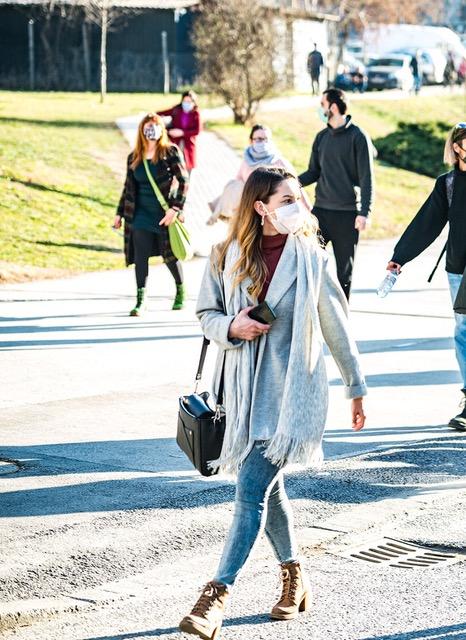CONVERSATION | Ljupka Trajanovska: Every woman is a potential victim of violence due to the unequal distribution of power in society

Today, November 25, marks the United Nations International Day for the Elimination of Violence against Women and the beginning of the 16 days activism against gender-based violence. In the spirit of the day, we talk to Ljupka Trajanovska, MSc in Gender, Violence and Conflict at the University of Sussex in Brighton, UK and a Chevening Fellow.
As an activist and researcher at the Center for Research and Policy Making, Trajanovska points out the devastating statistics with which every seventh woman is a victim of physical or sexual violence, and every second one is a victim of psychological violence.
Amendment to the Criminal Code to adequately sanction crimes such as psychological violence, stalking, sexual harassment, forced marriages, female genital mutilation, forced sterilization and forced abortion, which are regulated by the Istanbul Convention, to which the country is a signatory, and is a priority, says Ljupka Trajanovska, who has been dealing with activism and advocacy for women's rights and prevention and protection from all forms of gender-based violence since 2015.

What is the picture with violence against women in Macedonia?
- Violence against women in Macedonia is ubiquitous and widespread in every sphere of life, starting from the home, the streets, to the online space. In Macedonia, every second woman is a victim of psychological violence, and every seventh victim of physical or sexual violence. 60.000 women were stalked, and 60% of the women killed in the country were killed by their current or former intimate partners. Sexual harassment, stalking, femicide are not yet criminalized in our legislation, and in order to prove rape, it is necessary to prove the use of physical force.
We are witnessing, and some of us are, victims of the pandemic of online sexual harassment in the past two years. Quarantine during the Covid-19 pandemic did not stop violence against women, on the contrary it expanded and increased it. Viber Public Room, Telegram Public Room and the latest Facebook Public Room, which targets Roma women and girls, are just part of our reality that passes again without sanctions, without responsibility of the perpetrators and without protection of the victims. Although criminal proceedings have been instituted against two of the administrators, the criminal acts for which they will be held accountable are inadequate.
The absence of properly regulated crimes leads to inadequate convictions and failure to act on charges, thus discouraging victims from reporting and seeking protection. Condemnation, shame and fear for their lives or those of their children are also social factors that deter victims from reporting violence. At the same time, the revictimization by the competent institutions, the media and the society is part of the reality that the victims face when reporting violence.
The adoption and entry into force of the Law on Prevention and Protection against Violence against Women and Domestic Violence is an important step in the harmonization of national legislation with the Istanbul Convention, but it is not enough. The effective implementation of this Law by all competent institutions (police, public prosecutor, judiciary, health institutions, inter-municipal centers for social work, etc.) as well as synchronization of the Criminal Code with the provisions of the Istanbul Convention will create a functional legal framework that will prevent and will protect women from violence.
What can be considered violence against women? What forms?
- According to the Law on Prevention and Protection from Violence against Women and Domestic Violence, gender-based violence against women is “violence directed against a woman because she is a woman or who disproportionately affects her. "Gender-based violence against women covers the causes and consequences of the unequal power balance between women and men as a result of a social rather than an individual problem."
Hence, the most common forms are: sexual violence-rape, including sexual harassment and sexual extortion, physical and psychological violence, femicide-murder of women, stalking, forced marriage, forced sterilization or abortion, female genital mutilation and others. Different forms are characteristic, ie they occur more to certain vulnerable categories such as economically dependent women, single mothers, young women and students, Roma women, sex workers, but what they have in common is that absolutely every woman is a potential victim of any form of violence precisely because of the unequal distribution of power in society.
Why is it necessary to amend the Criminal Code? What will be achieved?
- At the moment, the Criminal Code criminalizes only rape as a separate crime and to prove it requires the use of physical force in committing. Consent is the only criterion that should exist for the qualification of the crime, and the use of physical force should be treated only as an aggravating circumstance. The psychological violence, stalking, femicide, sexual harassment, forced marriages, female genital mutilation, forced sterilization and abortion that are regulated by the articles of the Istanbul Convention are not yet properly and fully regulated as crimes.
Macedonia ratified the Istanbul Convention in 2018 and thus gained the obligation to adapt and direct its legislation towards the prevention and protection from violence against women and girls. Living free from fear for one's life and one's security is a fundamental right of every human being. The harmonization of the Criminal Code and the appropriate sanctioning of criminal acts will lead primarily to their prevention, but also to appropriate action on charges, proper interpretation of laws and passing verdicts that will sanction the perpetrators and protect victims from the continuation of violence.
The Center for Research and Policy Making within the Regional Program of the European Union, UN Women Skopje and UN Women "Prevention of Violence against Women and Girls: Implementing Norms - Changing Attitudes" in partnership with the National Network implemented a project for harmonization of national legislation with the Istanbul Convention. Marija Risteska, Executive Director of CRPM, was part of the working group for amendments and harmonization of the Criminal Code with the Istanbul Convention. Almost a year has passed since the amendments were drafted. Although the Government approved them, the public debate in the Parliament has not started yet, ie the scheduled public debate was postponed due to political interests. Unfortunately, the protection of 50% of the population in the country from various forms of violence that disproportionately affect them, is still not a priority for our MPs. With this, I would like to publicly call on the MPs to prioritize this issue as soon as possible and to immediately vote on the amendments to the Criminal Code.

How to raise awareness of this problem and who should be involved to overcome it?
- The problem with the awareness of violence as well as the solidarity and empathy towards the victims seems to be the most difficult task to solve. This process must begin at an early age. Every time a kindergarten teacher or parent tells a girl "she's hooked on you because she likes you" or "he's a man, leave him, that's all" he becomes the creator of the problem of violence. Tolerating, justifying and normalizing violent behavior in the first days of socialization of children creates a basis for potential perpetrators and victims. Violent behavior is unfortunately deeply rooted in our mentality and springs from patriarchal values nurtured in society. Prevention of violence must begin in kindergartens and primary education.
In addition to prevention, protection and access to services for women victims of violence must also be a priority. Currently, the number of functional shelter centers for women victims of violence, centers for reporting sexual violence as well as psycho-social counseling centers is insufficient and we still do not meet the minimum standards for services required by the Istanbul Convention. Programs to work with perpetrators of violence and change their behavior are almost non-existent, and are extremely important in preventing potential recurrence of violence. The first family center run by the civil society organization HERA is the only one that offers counseling to victims, their children and perpetrators of violence.
Last but not least, the gender sensitization of police officers, social workers, public prosecutors, judges, lawyers, health professionals and all those relevant stakeholders who are responsible for providing assistance, support and protection to victims. According to all surveys conducted in recent years, there is a huge institutional distrust due to the non-functioning of the system for protection and reporting of violence by women victims of violence.


